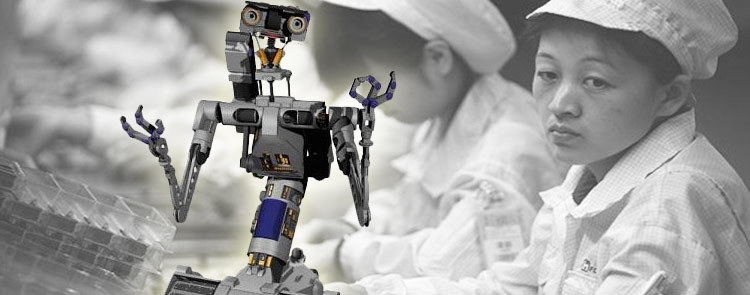
Guide: Introducing robots and then replacing humans on the production line? This idea is gaining popularity. “Yes, robots are faster and don’t complain about overtime.” Industrial robots have been promoted as “Made in China” to fight against hardships, transformation and upgrading. However, whether the robot can completely replace the Chinese workers is still unknown. On the contrary, it is a noisy domestic robot industry, and it seems to repeat the old road of "Made in China."
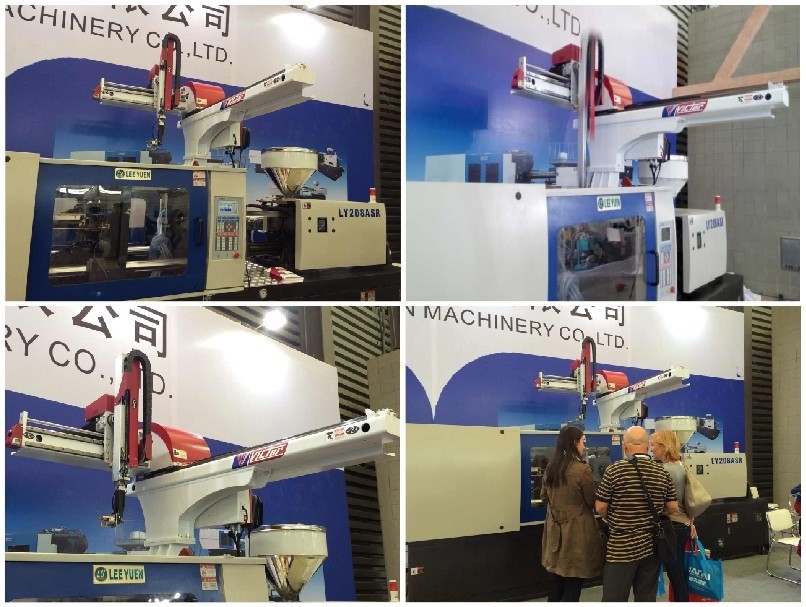
Industrial robots have been promoted as the only way to "make China" against the difficulties of employment and transformation and upgrading.
Every November, the Pearl River Delta and the Yangtze River Delta, factory executives are more busy for recruitment. In the “labor shortage”, Dongguan, Shunde, Shaoxing, Wenzhou, etc., the small factory has posted the recruitment notice to the nearby roads, and the large enterprises will directly go to the mainland provinces to recruit to deal with the shortage of labor before and after the Spring Festival. situation.
However, Chinese factories are now reaching out to new players – automation equipment led by industrial robots. The “pay” for recruiting the latter is based on a similar formula: the price of introducing robots (automated equipment) is equivalent to the monthly salary that can replace workers, multiplied by 12, and multiplied by 1.5 to 5 times. Once the transaction is made, the worker is exempted. For example, according to Tencent Finance's "Prisma", in the developed stamping industry in the Pearl River Delta, the monthly salary of workers is about 4,000 yuan, so the price of machine substitution is between 50,000 and 250,000. This number has become the most basic investment for factories to reduce workers.
This kind of investment has been regarded as a pioneer experiment by Chinese factories and is now popular in the manufacturing industry. Since last year, local governments have become the driving force behind such human-machine transactions. In May of last year, Zhejiang had listed “machine substitution” as an industrial policy. After that, Dongguan and Shunde in Guangdong immediately followed suit to provide subsidies for factories that replaced workers. In all parts of the country, the robot industry park was everywhere.
Since last year, China has become the world's largest consumer of industrial robots. In the first half of 2014, the number of imported industrial robots in China reached 34,714 units, a year-on-year increase of 92%. In China, the newly established domestic and foreign robotic automation companies have more than one daily. The speed is growing.
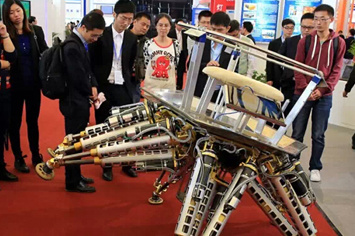
The Shanghai Industry Fair, visitors are surrounded by a walking robot.
From November 4th to 8th, at the China International Industry Fair held in Shanghai, the N1 "Industrial Robot Pavilion" became the hottest venue. More than 100 exhibitors exhibited a wide range of robots that can perform professional operations such as welding, cutting, handling, trimming and drilling, etc. Some service-oriented and entertainment-type robots that make coffee and play Rubik's Cube are surrounded by groups. .
For a time, industrial robots have been promoted as "Made in China", especially labor-intensive enterprises against the difficulty of employment, transformation and upgrading of the only way. In the post-90s industrial workers began to become the main force of labor, the era of manufacturing in all directions, those industrial workers who have supported China for more than 30 years and are known for their hard work and hard work, really have to withdraw from history?
In some reincarnations, many companies that learn from international giants and madly make robots, and many unconsciously repeat the old path of "Made in China."
“Before it was a man who was full of artificial and black pressure.” The founder of Foshan Ailebo robot, Nong Baile, described the stamping workshop he had seen, including the beautiful factory: the iron piece experienced many opponents, punching and turning Holes, punching, flanging, discounting... The workers constantly work overtime and keep shifting.
China's stamping industry plays an important role in the world, and the world's 90% stamping process is completed in the Pearl River Delta and the Yangtze River Delta. Nong Baile originally worked in the financial sector and later joined the ranks of helping factories to replace people with machines. The price was about 50,000 for one person.
This price was described by Nong Baile as “the price”. After the introduction of the Labor Law in 2008, the wages of stamping workers in the Pearl River Delta rose from 1,800 yuan to 4,000 to 4,500 yuan.
I have hired two hands, but I have come alone.
"In the stamping work, the absolute speed of people's movements is faster than that of robots, but people's movements can't last for a long time, not stable enough, and humanity has an uncontrollable side. It can't do 24 hours." Nong said to Prism. "There are also compensation for work-related injuries. One finger is 100,000, two fingers are 200,000, and one palm is 500,000. If it is a small factory, the liquidity will be lost."
Henry Ford once said, "I have hired a man who has come to a single hand." - Now, a generalized industrial robot is a multi-functional robot that can be automated and reprogrammable, and has three or More than three freely programmable axes of motion appear to be a simplified combination of human upper limbs.
“No work injury, no complaints.” This is the investment advertisement of a domestic robot company at the Shanghai Industrial Fair last year. In fact, the earliest machine substitutions in Chinese factories are due to the increasing risk of workers being injured. Stations with high repetitiveness and harsh environments, such as fuel injection, polishing, etc., are the first places where robots enter.
In addition to the hand, there is also a "foot". Chen Hongbo, deputy general manager of Shunde Jiateng Electronics Co., said that this is the world of general workers: “The porters are the hardest. Many people go for a week and the mobility is very high. The former workers are better. Now the young workers sometimes even I can't hold it for a day."
This kind of labor also happens in the e-commerce warehouse with fashionable concepts. Chen Hongbo once made statistics. During the double eleventh period, the workers in an e-commerce logistics warehouse should hold the box for about 50 to 70 kilometers per day, more than two marathons.
The automatic handling robot (AGV) manufactured by Jiateng is operating in the US and Huawei factories, with an average price of about 70,000 yuan per unit. Chen said that this is also the psychological index of the “price” of the porters. In fact, the "price" of the workers is already very clear. "The new generation of workers is at least 9 years of compulsory education, the only child, they would rather go to the office building for 3,000 yuan, and they are not willing to pay 4,000 yuan to the factory." Nong Baile said. "In addition, social security and average wages have been raised year after year, and now there is no shortage of machines."
Since 2013, the Chinese labor market has entered the Lewis turning point, and there has been a decline in the total labor force. All factory managers who have spoken with Prism say they are facing the problem of labor age faults.
Wang Huichao, who worked in Dongguan in 1998, is now the director of Dongguan Yuncheng Electroplating Workshop. He recalled that in the past, when there was no robot or automation, he had to carry dozens of kilograms of workpieces a day more than a hundred times - "Now the workers can't do this. Their parents don't expect them to make such money."
Liao Yuchan, 26, is an assembly line worker who worked in Foxconn in Shenzhen and Chengdu for two years and now works in a LED factory. She said that she has been living a very monotonous life: sitting on the assembly line at work, repeating the action of taking and threading, repeating every minute, and her income depends on her movements. How fast.
In fact, China's industrial workers, especially the general workers, have long assumed the role of high-intensity, rapid, and repetitive labor. "In the factory, no matter what you do, it will eventually become a robot." Liao Yuchan said. This statement is not an exaggeration. Many workers in the Pearl River Delta have had similar expressions on Prism.
For Chinese manufacturing, how to make the work of the general workers - or directly say a certain repeated action - to be faster and more accurate is the proposition of the production supervisors for many years, and also the Chinese manufacturing in the past in the world. A big "advantage" of the rise.
Deng Qiuwei is the deputy general manager of Leibo Technology. He has worked in Taiwan-funded factories and has long studied how to reduce the waste of workers and speed up the frequency. In the past few years, he has become a pioneer in the "machine substitution", and transferred the research energy of the workers' fine production to the countdown to the robot. "If a mouse passes 50 workers, one person wastes one second is 50 seconds. Many seconds can be replaced by robots." Similar thinking hangs in his mouth, and the direct change is in two years, Lei Bai The number of workers in the factory has been reduced from 3,000 to more than 800 now, and hundreds of robots have been added.
Deng Qiuwei said that the changes in the Midea Group's factory surprised him: those simple and repetitive jobs, such as handling and palletizing, have been replaced by robots and automation in two years. "Prism" is also known, including domestic manufacturing giants such as Foxconn, and has already made machine substitutions at similar stations. Last fall, Wu Wenxin, vice president of air conditioning in the United States, said that in 2014, the number of workers in the air-conditioning factory was cut in half, and the stations and movements such as handling, packing, and labeling were replaced by robots. In the machine-changing factory, KPI adjustment and worker retraining have also become new propositions.
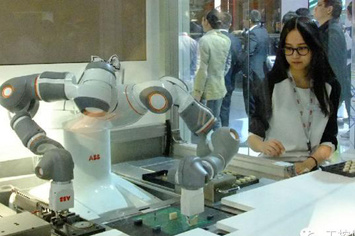
At the Industry Fair, a young lady watched the robot quietly.
Some of the workers affected by robots and automation equipment have to learn to “get along with the machine”. There is a phenomenon that has appeared in the workshop after the transformation: the intervention of the machine has increased the output, which has impacted the piece-rate compensation system that the workers used to use. So, some workers will deliberately slow down the production to prevent the supervisor from increasing the work for the production line. the amount.
In Zhejiang and Guangdong, the government is subsidizing the substitution of machines. Most of these subsidies are used by factories to purchase automation equipment, including robots, ranging from 10-15%, and some even reach 20 %. Companies with a capital scale have accelerated the pace of getting workers out of the production line in this policy.
The US side said to Prism that Midea’s group robots will exceed 800 units this year, and in the later period, they will invest in robots with an increase of about 30% each year. It is estimated that the cost of robots in 2016 will exceed 300 million yuan. "Prism" also learned that in the US small household appliances division, under the premise of not reducing the output value, the annual reduction of 200 people becomes an internal task indicator.
People in the industry all said that the emergence of robots has rarely led to the phenomenon of workers being cut, because the "machine substitution" has just begun, and the overall shortage of employment is still not solved. In most of the machines that have been replaced by machines, the original production line, which is connected by a large number of workers, is still largely preserved.
Under this situation, the robot industry has also rapidly entered China's high-speed lanes, and has been urged by local governments and industrial capital as a new engine for real economic growth. In the "machine-changing" production line of Chinese factories, the battle for the station is starting, and various automated experiments are blooming everywhere. However, whether the robot can completely replace the Chinese workers is still unknown. On the contrary, it is a noisy domestic robot industry, and it seems to repeat the old road of "Made in China."
At present, the local governments in the Pearl River Delta and the Yangtze River Delta are pushing the “machine substitution” and providing assistance after the event, loan and loan linkage, equipment rental subsidy and loan interest subsidy. In Dongguan and Shunde, the equipment purchase fee is subsidized by 10%, and the subsidy amount of a single enterprise is up to 1 million yuan. In Zhejiang, subsidies for the implementation of “machine substitution” for enterprise leasing equipment reached 15%.
It is worth mentioning that the machine substitution policies of various places mostly specify the equipment products of local enterprises. In the past two years, more than 40 robotic industrial parks have emerged in China, and the investment in robot-related enterprises has also become hot. A leading robot company in Guangzhou was once subsidized by Shanghai with a subsidy of 300 million yuan. In the end, Guangzhou is not only promised the same conditions, but also promised the land.
Chen Qizhong, director of the CNC R&D department of Guangzhou, once calculated such an account for robot investment: the establishment of a robot manufacturing plant requires at least 200 million yuan, and then more than 1,000 production and sales per year, otherwise the profit will not be discussed. When a large amount of capital enters the intelligent manufacturing industry, many industrial robots have begun to sell at the price of “cabbage”.
"In order to increase the quantity, many automation companies are desperately going to the ontology and selling the ontology, and one earns 10,000 yuan and 5,000 yuan."
In fact, domestic robots have a development track similar to “Made in China”: components such as reducers still rely on imports from countries such as Japan and Germany, and products are basically “assembled”; on the other hand, word of mouth and technology are developed. For many years, overseas brands have more competitive advantages in the market, and domestic robots basically go to the strategy of selling prices.
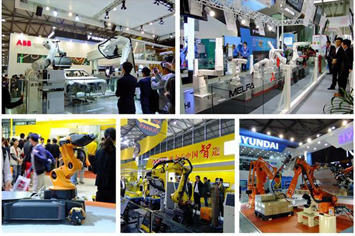
At the Industry Fair, Chinese and foreign robot manufacturers competed in the exhibition.
In any case, under the mobilization of the government, Chinese factories are experimenting with machine substitutions of large and small. In 2014, Wenzhou will organize 500 companies to carry out “machine substitution” work; Dongguan official data shows that nearly 70% of enterprises invest funds to carry out “machine substitution” work, and 92% of enterprises said that they will continue to increase in the next two years. Great investment or consideration.
Dongguan Longchang Toys Group, which is mainly engaged in export OEM, is one of the machine substitution companies. Last week, Longchang was responsible for the reduction in the number of workers and the increase in the rate of yield, and for Prism, it showed its effectiveness in promoting machine substitution.
In fact, the toy industry is a “hardest hit” in China's manufacturing industry that has been restricted by many environmental factors in recent years. The person in charge of Dongguan Longchang admits that the group itself has moved to Southeast Asian countries such as Indonesia. “Low-end, labor-intensive factories go out,” the official said. “Leave in Dongguan to do 'machine substitutions', on the one hand because of Dongguan’s supporting policies, and on the other hand because the group’s leaders have Do not give up 'the determination.'
The Becker Sporting Goods Company in Wenling, Zhejiang Province also made a subversive attempt. The footwear industry is generally considered to be highly dependent on manpower. The fully automated shoemaking technology is currently not mature from a global perspective. The company invested millions of dollars to purchase equipment to build a replacement of the original 60 workers with 18 workers. Automated production line.
For the manufacturing industry, "machine substitution" has become a pioneering measure for technological transformation and even industrial upgrading. The Dongguan government has indicated that enterprises in the industry, such as electronics, machinery, food, textiles, clothing, furniture, footwear, chemicals, logistics, etc., which have obvious characteristics of repeated labor, high labor intensity and certain risks, especially labor-intensive enterprises. Implement the "machine substitution" application.
In fact, for many small and medium-sized manufacturing companies, “machine substitution” is not necessarily a choice that suits the actual situation. The factory owners with a number of workers of no more than 200 said to Prism that they did not have sufficient investment in automation investment to reach the level of government support subsidies, nor could they see the prospects for orders in the next two or three years. Think carefully.
In those large factories that have made machine substitutions, production managers have to face various "experimental costs": robots are difficult to handle the action of mouse wheel embedding, robots can't catch "heavy and fragile" ceramics, automatic transporter climbs Not a slope with too much angle, a lot of forests, "even if it is a wall, as long as the brick specifications are not highly consistent, the robot can't do it."
Manager Deng Qiuwei said that for Chinese workers, the launch of robots and automatic equipment will at least give them the opportunity to become “blue-collar” workers: “At least, the workers responsible for regulating robotic equipment will have less duplication of work and wages will be higher. And there is a rising channel." Deng Qiuwei said, "They can be proud of them."
Worker Liao Yuchan's thoughts on this are more poetic – she said to Prism that she prefers liberation and freedom, and even listens to music and plays with her mobile phone in the factory.













